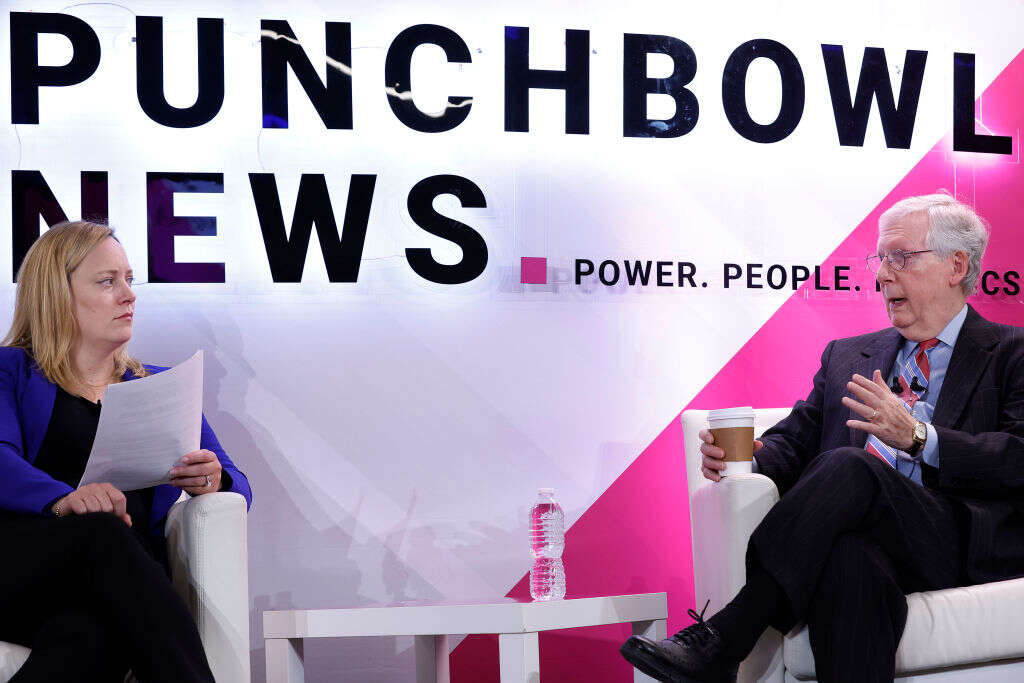
When Anna Palmer, Jake Sherman and John Bresnahan left Politico to start their own Washington, DC news outlet, Punchbowl News, it came as something of a surprise to America’s political journalism establishment.
“I think a lot of people thought we were a little crazy,” Palmer, the chief executive of Punchbowl, told Press Gazette’s Future of Media Explained podcast. “Because we had such a great perch and we had done a lot with the platform.”
Palmer and Sherman had since 2016 been the authors of Politico’s flagship newsletter, Playbook. They took over Playbook from Mike Allen, who left the news organisation to help launch Axios.
Palmer said that leaving Politico to launch Punchbowl was “scary”. But she added that taking over Playbook, as an already established brand, was “probably almost scarier in some ways”.
Nearly two years after the launch of Punchbowl – which set out to cover the people, power and politics inside Washington – Palmer believes her team has proven itself. In its first year, the company is said to have generated revenues of $10million. And after starting with four staff, including vice president of product and growth Rachel Schindler, Punchbowl is today a team of 16.
Palmer, who grew up on a farm near Fargo in North Dakota, first joined Politico in 2011. Alongside her day job, she led Women Rule, a platform aiming to expand leadership opportunities for women. In 2019, Palmer and Sherman authored a New York Times bestseller titled, “The Hill to Die On: The Battle for Congress and the future of Trump’s America”.
Punchbowl News went live on 3 January 2021 – three days before the 6 January insurrection of the Capitol. “Our world was under attack,” said Palmer, who lives on Capitol Hill. Sherman and Bresnahan were reporting from the area that day.
“It was a pretty terrifying day. There have been some reporters who haven’t been able to return because it was that scary. And I think we looked at it as also a huge challenge of: how are we going to cover this institution in a moment of crisis?”
Asked how the politics of the US has changed over the past two years, Palmer said: “I think we are in a moment of extreme tribalism in the US right now. I think you see it in other countries as well. But I think from my time, in almost 20 years of working here, there’s probably never been a more partisan time.”
Like Axel Springer-owned Politico and Bloomberg Media, Punchbowl believes it has an opportunity to succeed in this environment. “One of the things that we really pride ourselves on at Punchbowl News is the idea that we are non-partisan,” said Palmer. “We call balls, we call strikes – we’re experts in understanding the process of what’s going to happen. And I think the proof is in the pudding, where we are read by just as many Republicans, on Capitol Hill and lawmakers, as we are by Democrats.”
Punchbowl News offers its audience a free morning newsletter and a ten-minute podcast, recorded by Palmer and Sherman at 5am each weekday. They also sell premium membership, which includes access to paid-for newsletters, exclusive polling and events hosted by Punchbowl.
Asked about Punchbowl’s finances, Palmer said it had generated revenues of $10million in 2021, including more than $1million from subscriptions. “This past year, I would say we have doubled down on all of that,” she said. “So, we have not shared a number publicly on what our revenue is this year. I will say I’m very focused on our subscription business.”
Washington, DC already had a saturated media market before the launch of Punchbowl News – with legacy newspaper brands, TV stations and digital companies like Politico and Axios fighting for space.
Asked how Punchbowl was able to establish itself in this market, Palmer said: “We really focus on making sure that we’re indispensable – that you are getting information from us that you are not getting from anywhere else.
“If we are doing the same things as other news organisations, in terms of coverage or in terms of stories, then we’ve probably kind of lost our reason to exist. We really focus on [breaking] news. We really try to bring people behind the scenes in terms of what’s actually happening. And I think the other big differentiator is we really understand the process.”
Email pged@pressgazette.co.uk to point out mistakes, provide story tips or send in a letter for publication on our "Letters Page" blog
